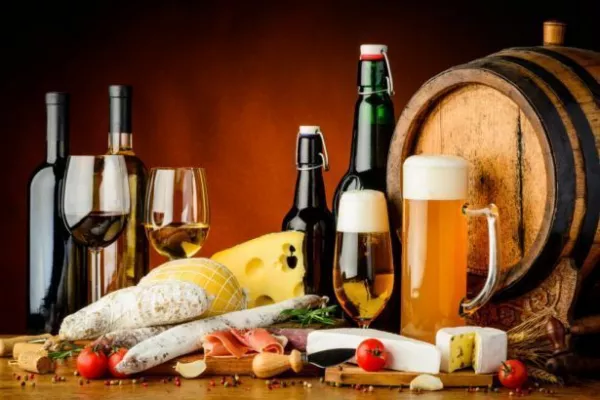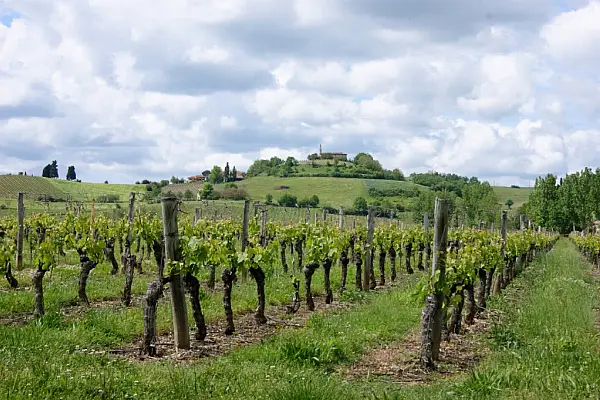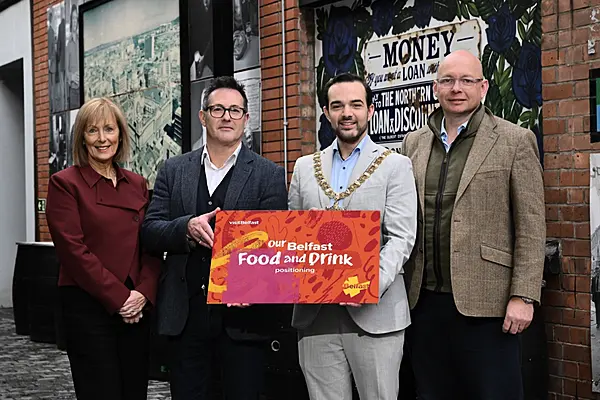Hospitality Ireland presents a round-up of global food, drinks and restaurant news.
Greggs Weathers Supply Chain Disruption With Sales Rise
British baker and fast food chain Greggs set out an ambitious growth target as its raised its full-year profit outlook on the back of strong trading in the latest quarter despite staffing and supply chain disruption.
Shares in Greggs rose as much as 12%, hitting a record high and extending 2021 gains to more than 75%, after the group detailed a plan to double annual turnover to approximately £2.4 billion by 2026.
Greggs, best known for its sausage rolls, steak bakes, vegan snacks and sweet treats, plans to accelerate its rate of net shop openings to about 150 per year from 2022 from 100 in 2021 and sees potential for at least 3,000 shops from 2,146 currently.
The group also plans to extend evening trading to more shops and build on the success of a delivery service in partnership with Just Eat that has already been rolled out to 943 outlets.
In the long term it sees potential to expand overseas.
Greggs' third quarter like-for-like sales rose 3.5% compared to two years ago, before the pandemic impacted trading.
It said growth was particularly strong in August when a "staycation" effect was evident and remained in positive territory in September, with two-year like-for-like growth of 3.0% in the four weeks to Oct. 2.
However, the group said it had not been immune to Britain's well documented pressures on staffing and supply chains, and had seen some disruption to the availability of labour and supply of ingredients and products in recent months.
"I wake up every morning and I find out what's short that day because something has been disrupted in the supply chain," CEO Roger Whiteside told Reuters.
"There's some different thing going on every day, with some different item."
Despite acute pressures in the pork industry, he said supplies of sausage rolls were safe.
Food input inflation pressures were also increasing.
Greggs has short-term protection due to its forward buying positions but expected costs to increase towards the end of 2021 and into 2022.
Whiteside said he hoped Greggs could avoid passing this on to consumers.
"We have to watch the market. Greggs is a value leader so what we won't do is allow our leadership in value to be eroded, he said.
Despite all the disruption Greggs said its operational cost control has been good and subject to any unexpected COVID-19 disruption expected the full-year outcome to be ahead of previous expectations.
Prior to Tuesday October 5's update analysts' average forecast for full-year pre-tax profit was £133 million, according to Refinitiv data, versus a £13.7 million loss in 2020.
PepsiCo Warns Of Another Price Increase As Supply Disruptions Linger
PepsiCo Inc said on Tuesday October 5 that it would likely raise prices again early next year, as it looks to overcome ever increasing supply-chain challenges that include everything from a shortage of Gatorade bottles to a lack of truck drivers.
Chief Financial Officer Hugh Johnston told Reuters that PepsiCo had to "scramble" to overcome a shortage of cans and Gatorade bottles in the last few months as demand for its beverages jumped at restaurants and theaters following the lifting of pandemic-induced restrictions.
PepsiCo has already raised prices of its sodas and snacks in recent weeks, echoing the strategy of broader packaged foods industry as rising raw material prices pinch profit margins.
"I do expect there will probably be some price increases in the first quarter of next year as well, as we fully absorb and lock down the impact of commodity inflation," Johnston said, adding that he expects most supply-chain disruptions to moderate by the end of 2021.
PepsiCo's UK business has also been hit by a shortage of truck drivers in post-Brexit Britain due to immigration rules and a loss of about a year of driver testing and training.
However, Johnston said he does not expect a shortage of PepsiCo products in supermarkets, saying the company should be in better shape by the end of the fourth quarter.
The company said it was expecting fiscal 2021 organic revenue to rise about 8%, compared with its prior forecast of a 6% increase.
PepsiCo's third-quarter organic revenue rose 9%, 5-percentage points of which came from selling higher-priced products. Costs were up over 10%, driven by higher expenditure on distribution and marketing.
Net revenue rose 11.6% to $20.19 billion in the quarter ended Sept. 4, above analysts' estimates of $19.39 billion, according to IBES data from Refinitiv.
PepsiCo shares rose marginally in premarket trading.
NYC Will Not Enforce Restaurant Customer Data-Sharing Law While DoorDash Sues
New York City agreed to hold off on requiring food delivery companies to share customer data with restaurants, the subject of a recent lawsuit by DoorDash Inc .
In a joint filing on Monday with the U.S. District Court in Manhattan, the city said that it will not enforce a new law requiring the disclosures while the lawsuit is pending, and DoorDash withdrew its request for an injunction to block enforcement.
DoorDash sued the city on Sept. 15, calling a requirement that food delivery app companies provide customers' names, phone numbers, email addresses and delivery addresses to restaurants a "shocking and invasive intrusion of consumers' privacy."
The San Francisco-based company also said the law would let restaurants "free-ride" on data they would not demand from in-person diners.
Since the COVID-19 pandemic began, New York City has tried to help restaurants that had resisted food delivery app fees as high as 30%, but which became more dependent on delivery as dining rooms closed or limited capacity and people ate at home.
In a separate case, DoorDash and rivals Grubhub Inc and Uber Eats sued the city on Sept. 9 over a law capping fees that delivery companies charge restaurants.
They said that law has cost them hundreds of millions of dollars in revenue.
The case is DoorDash Inc v City of New York, U.S. District Court, Southern District of New York, No. 21-07695.
Coffee Plunges 4% On Fund Sell-Off Amid Forecast For Rains In Brazil
Arabica coffee futures on ICE closed more than 4% down on Tuesday as speculators liquidated part of their long position amid forecast for ample rains over coffee fields in the top grower Brazil.
Raw sugar closed up following the rally on energy prices.
COFFEE
* December arabica coffee closed down 8.45 cents, or 4.2%, at $1.919 per lb, after hitting a two-month high of $2.0685 in the previous session.
* Some speculators who bought coffee futures in the previous sessions due to uncertainties related to supplies next season decided to liquidate part of that position as ample rains are seen falling over crops in Brazil in coming days.
* "On Friday we saw OI (open interest) increase by an impressive 8.8k lots that appeared to be specs adding to longs, and this continued with another 1.2k lots on Monday," said Ryan Delany, chief analyst at Coffee Trading Academy, LLC.
* "However, it is hard for the market to be super bullish on drought when it is raining and projected to continue raining above and beyond normal," he said.
* Refinitiv's Agricultural Weather Dashboard indicates rains of up to 90 millimetres (3.54 inches) for the next weekend in South Minas Gerais, Brazil's number 1 coffee region.
* The added moisture should help crop development for next year's harvest, although more is needed.
* November robusta coffee settled down $37, or 1.7%, at $2,111 a tonne.
SUGAR
* March raw sugar rose 0.16 cent, or 0.8%, at 19.85 cents per lb as energy prices soared.
* The increase in energy and fuel prices is spreading to renewable fuels and feedstocks, dealers said.
* "Renewables are catching a bid as crude keeps marching higher," said a U.S. sugar broker, adding that futures of soybean oil and palm oil were also up strongly.
* The world's sugar supply balance is expected to improve in the 2021/22 season due to higher production in Asia and Europe, broker StoneX said on Tuesday.
* December white sugar rose $4.90, or 1.0%, at $507.50 a tonne.
COCOA
* December New York cocoa settled up $3, or 0.1%, to $2,755 a tonne. The contract hit a 10-month high of $2,792 on Monday.
* December London cocoa fell 10 pounds, or 0.5%, to 1,887 pounds per tonne.
EU To Extend Support For Wine, Fruit And Vegetable Sectors
The European Commission said on Wednesday it would increase support and extend existing measures for the wine, fruit and vegetable sectors after they suffered from spring frosts, floods and heat waves this year.
Agriculture Commissioner Janusz Wojciechowski said the sectors' problems had come on top of a difficult 2020 due to the COVID-19 crisis.
"These much-needed support measures will (relieve) producers across the EU during these difficult times, on top of the ones already put forward in 2020 and extended in 2021," he said.
For wine, the EU budget contribution to harvest insurance has been increased to 80% from 70%, and the bloc has doubled the support it provides to cover the cost of setting up mutual funds.
For fruit and vegetables, the EU will provide compensation to producer organisations of at least 85% of last year's production levels even if this year's value is lower.
The compensation is offered if production is down at least 35% from the previous year due to natural disasters, climatic events, plant diseases or pest infestations.
The Commission has already offered support to the wine sector, with measures in 2020 including the provision of more funds for vineyard conversion and green harvesting. Other measures have helped fruit and vegetable producers.
These "flexibility measures" would be extended until Oct. 15, 2022, the Commission said.
France Raises 2021 Wine Output Forecast; Still Down 27% Year On Year
France's farm ministry on Thursday October 7 raised its estimate of the country's wine output this year, citing increased estimates for the Champagne, Bordeaux and Charentes regions, but it would still be down 27% on 2020 after frost and disease damaged crops.
In its latest monthly estimate, the ministry pegged this year's wine production in France at 34.4 million hectolitres, up from 33.3 million forecast last month.
"The summer precipitation contributed to the enlargement of the berries in these basins," the ministry said in a statement.
Almost all wine-growing regions were affected by adverse weather, although with varying intensity, the ministry said.
Total Champagne output was now seen falling 28% from last year, against an estimated fall of 36% last month. It would still be the lowest in 40 years, which could lead to reserves from previous years being used, the ministry said.
Vineyards in Champagne were severely hurt by heavy summer rainfall that led to the development of mildew fungus which attacks the grapes and causes the leaves to dry up.
In the Bordeaux region, output was now seen falling by 21% from last year, against an estimated fall of 25% seen last month, lifted by precipitation at the end of summer in the region.
In the Burgundy-Beaujolais region, hit severely by a mixture of frost, hail and disease, output was seen falling 51% from last year, an estimate revised downwards from a fall of 47% seen last month.
Wine output in Charentes was estimated to be down 11%, compared with a 21% drop forecast last month.
Sparkling Champagne Sales Ease Gloom Over Ravaged Vineyard
Champagne sales are set to reach a four-year high this year, driven by strong exports to the United States and Australia, champagne wine growers lobby SGV said on Thursday October 7, adding that Brexit and a row with Russia had not hit volumes.
The forecast should cheer wine producers that face their worst output in 40 years in 2021 after vineyards were ravaged by frosts and mildew fungus attacks.
The industry also suffered from the closure of bars and restaurants during the pandemic.
But in 2021, the progressive reopening of markets and an economic upturn will likely allow sales to rebound to 305 million bottles of 75 centilitres. That compares with 297 million in 2019, before COVID-19 and a year taken as a benchmark by SGV.
"In winemakers' memory we never had such a complicated year in terms of harvest but things are much better on the trade front," SGV Chairman Maxime Toubart told reporters.
The recovery was led by exports with sales between January and August jumping 11.9% compared to the same period in 2019 while they fell 2.4% within France.
Champagne is typically made from a combination of wines produced the previous year and earlier.
The estimates are a total from wine growers and large champagne houses such as family-run Taittinger, LVMH's Moet & Chandon and Pernod Ricard's Mumm.
Britain's exit from the European Union in 2020 led to more paperwork but did not affect champagne sales, the SGV said.
Neither did a Russian law forcing foreign champagne producers to add a "sparkling wine" reference to the back of their bottles.
The champagne industry group CIVC had asked its producers to boycott Russia following the introduction of the law in July but producers agreed to resume exports last month.
Riverside Restaurant Makes Waves In Thailand As Flood Dining Goes Viral
Riverside restaurant owner Titiporn Jutimanon was convinced a bout of flooding in Thailand could be the end of a business already struggling from the pandemic.
But with the rising tide of the Chao Phraya river this week came an unexpected opportunity.
Instead of closing for the floods, Titiporn's eatery is making waves in Thailand, staying open for customers who are revelling in shin-deep dining, and the thrill of avoiding the rush of water set off as boats go by.
"Customers absolutely love the waves," said Titiporn, who runs the Chao Phraya Antique Cafe in Nonthaburi, north of Bangkok.
"What I thought would be a crisis turned into an opportunity."
Videos have gone viral on social media of customers sitting on drenched chairs, taking mouthfuls of food as long-tail boats buzz by, then moving out of the way as waves hit.
Approximately 30 northern and central provinces have been hit by flooding in recent weeks, raising levels of the famous river that flows through Bangkok.
Titiporn's business was forced to close during COVID-19 lockdowns, but she's glad she decided to brave the floods.
"Not only do they love the atmosphere and the barbecue pork and the view of the sunset ... the flood became an additional unique factor," she said.
"I feel so lucky that the customers love it, the flood wasn't a challenge for them to come."
Customers cheer and laugh as their wooden stools are knocked over by the water that breaches the restaurant.
It holds two sittings each day for diners to enjoy the experience when the water levels are highest.
"It's a fun challenge - you don't know if you'll get washed away somewhere while eating," joked customer Jetdanai Boonrod, 30.
Ivory Coast Caps Local Firms' Share Of Cocoa Exports, Say Sources
Ivory Coast's cocoa board will allocate a maximum of 200,000 tonnes of cocoa to local exporters this season, half as much as envisaged under a government decree to boost local firms' competitiveness, five industry sources told Reuters on Thursday October 7.
In May, the government ruled that 20% of cocoa purchases by multinational companies in Ivory Coast should be fulfilled by local firms in an effort to improve competition in the world's largest cocoa-exporting economy.
This share would have represented more than 400,000 tonnes of beans in the 2021/22 season. But the Cocoa and Coffee Council (CCC) regulator has found it cannot be fully implemented as local exporters do not have the financial or logistical capacity to handle that volume, two sources at CCC said.
"We have started to allocate the volumes of international contracts to local exporters but we realise that they cannot export the 20% that the government has decided to give them," one of the sources said.
Speaking on condition of anonymity, three local firms said the CCC had informed them local exporters' share would be capped at 200,000 tonnes.
The decree was meant to change the status quo where major international players use their greater financial muscle to buy and export all available cocoa, while local firms lack access to financing and foreign chocolate makers to compete.
But banks are still wary of financing local exporters even when international contracts are guaranteed, according to the CCC sources and two banking sector sources.
For banks, the main risk lies in the weakness of the supply chain of many local exporters that must be able to secure the necessary volumes in the bush.
"These exporters represent too great a risk for us. They have no collateral and we are not sure that they will be able to buy the cocoa even if we give them the money," said the credit manager of one of the largest banks financing the cocoa sector.
Another banker said an expected drop in cocoa production this season had raised fears of stiff competition on the ground for beans, which will disadvantage small exporters.
"Under these conditions the small ones are a risk for us," the source said.
As a result, the CCC may reallocate international contracts from some local exporters, a third CCC source said.
"We can't risk local exporters defaulting so we are studying the possibility of cancelling the contracts of those who do not have financing and giving them to those who have financing," the source said.
News by Reuters, edited by Hospitality Ireland. Click subscribe to sign up for the Hospitality Ireland print edition.









